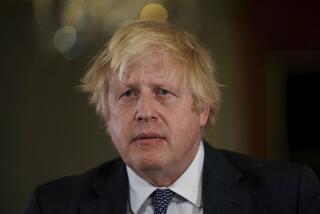With fresh ‘Brexit’ chaos over Britain’s delayed parliamentary vote, what are some potential scenarios?

It was the showdown that wasn’t.
On the eve of a key parliamentary vote expected Tuesday on the terms of Britain’s departure from the European Union, Prime Minister Theresa May called it off. That postponement set off a new round of now-familiar chaos associated with “Brexit,” Britain’s intended exit from the 28-nation bloc.
In a speech Monday to a raucous parliamentary session, the prime minister crisply acknowledged that the proposed divorce deal she negotiated with the EU and announced last month would have gone down to “significant” defeat if taken up by lawmakers as scheduled. No new date has yet been set for a vote.
May indicated she’ll try to salvage the deal somehow, but EU members are signaling they’re unlikely to go along with any major new changes. And the prime minister’s political opponents at home appear re-energized in their drive to push her out of office.
Here is a look at some potential scenarios going forward:
What’s May’s likely political future?
Rather bleak. Shouts of “Resign!” rang out in the parliamentary chamber as the prime minister spoke. The leader of the opposition Labor Party, Jeremy Corbyn, excoriated her, telling lawmakers that May’s government had “lost control of events.” Even so, Labor and its allies don’t appear to have the votes for a no-confidence motion against the prime minister – at least not yet.
The prime minister’s own Conservative Party hasn’t been much of a bulwark for her; internal rivals like Conservative lawmaker Jacob Rees-Mogg blasted the proposed deal she struck with EU negotiators as “undeliverable.” Before the postponement of the Tuesday vote, dozens of Conservative lawmakers indicated they would not lend their support to the deal.
What are potential financial repercussions?
Investors are increasingly worried about what could be a disastrous economic fallout from a so-called “hard Brexit” — Britain leaving the European Union without a legally binding agreement on relations going forward. Economists have said a no-deal departure from the bloc would likely result in a deep recession in Britain. European economies would almost certainly suffer too, although not as severely.
May’s take on that has hardly been reassuring; she says the risk of an “accidental” hard Brexit is increasing as infighting goes on and the departure date – March 29, 2019 – draws closer.
In response to Monday’s developments, Britain’s already-slumping currency, the pound, dropped to a 20-month low, and the stock market slipped.
How has May defended the deal?
She says it’s the best one available. But when it was unveiled, it was reviled by almost everyone – with Brexit backers saying Britain would remain bound by too many European rules, and “remainers” saying it would throw away all the advantages of membership in the bloc with almost nothing to show in return.
One big sticking point has been the border between Northern Ireland, which would leave the EU, and the Republic of Ireland, which would stay in the bloc. The frontier between them is open now, and that’s an important element of the 1998 accord that ended years of sectarian bloodshed.
The Republic of Ireland, backed by fellow EU members, does not want to leave open any possibility for the creation of a “hard” border, with customs posts and other infrastructure. Britain wants to avoid that too. Under the draft deal, that’s addressed with a provision known as the “backstop” – that if there’s no other agreement in place, the United Kingdom, including Northern Ireland, would remain part of the EU’s customs union, and couldn’t leave without European consent. Many British lawmakers, including allies and critics of May, fear that gives the EU too much leverage.
What about a do-over Brexit vote?
Although opposition to leaving the EU has become much more vocal as a departure date nears, there are worries that a new referendum would be deeply harmful to democracy, carrying with it the suggestion that a popular vote or election result could subsequently be cast aside. May alluded to those fears in her speech, asking if the country really wanted to revisit the divisive 2016 campaign, which ended in June that year with 52% of voters favoring leaving the EU.
Those who want to stay in the EU got a boost Monday from the European Court of Justice. The court ruled that even though Britain had formally given notice of its plans to leave — invoking Article 50 of the Treaty of Lisbon — that notification could be unilaterally revoked right up until the departure date.
Parliament would have to approve holding a new referendum, but as of now, there doesn’t appear to be support for that.
What have the Europeans said?
Even before May’s speech, key European officials made it clear the bloc was simply not willing to try to hammer out a whole new deal. Belgium’s foreign minister, Didier Reynders, told reporters in Brussels that some details could be tinkered with, but that the EU had already made clear its “red lines.” The Dutch foreign minister, Stef Block, said the EU would study anything May might propose, but said any new talks “won’t be easy.”
Somewhat less diplomatic was Guy Verhofstadt, the Brexit coordinator for the European Parliament. After word of the delay, he tweeted: “It’s time they make up their mind!”
May almost certainly can expect another earful on all this soon enough; she is due at a summit in Brussels this week.
More to Read
Start your day right
Sign up for Essential California for news, features and recommendations from the L.A. Times and beyond in your inbox six days a week.
You may occasionally receive promotional content from the Los Angeles Times.






